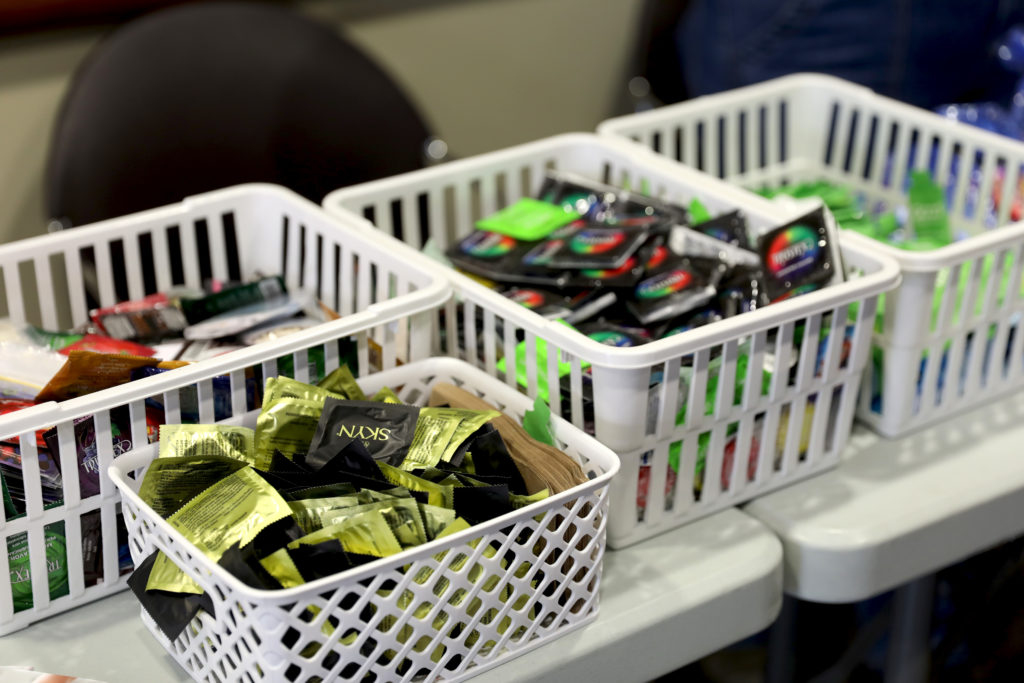Content Warning: This article contains discussions of rape, abortion, and sexual violence.
When Indiana native Chelsea McDonnel found out she was pregnant at 17 years old, the feeling of fear became consuming. She had no idea how her body would change and react. She was “terrified” of dying while pregnant.
This life-altering experience woke McDonnel up to the lack of sex education received by students in Indiana schools and led her to co-found the progressive advocacy organization MADVoters Indiana.
For every 1,000 births in Indiana, 17 of them are from 15 to 19 year olds. America’s Health Rankings shows that regardless of the lowering teen pregnancy rates in the nation, Indiana has one of the highest rates in the country. However, despite the high rate, sex education is not required in the state.
Hoosier students who have experienced sex education have expressed disdain for the curriculum and the topics discussed during the classes. Many report feeling ill-educated on how bodies actually work and what resources are available to them, much like McDonnel did.
According to the Sex Education Collaborative, Indiana schools are, at minimum, required to provide instruction on HIV, and the curriculum must stress abstinence as the expected social standard.
But Ball State director of Health Promotion and Advocacy (HPA) Suzanne Swierc says sex education should encompass much more than that.
“(It) includes information about the human body and its functions, what it can and cannot do, and how to take care of it,” Swierc says. “Sex education also includes conversations about consent. It needs to include conversations about how to pleasure and safety.”
Swierc says safety includes not just physical but also mental aspects. Students have to learn the importance of communication and how it relates to sexual safety.

The frustrations
Social work major James Nichols graduated from a small, rural high school in Crawfordsville, Indiana, and personally experienced a middle and high school education that lacked discussions of sex and sexual health. James says many of the students he graduated with weren’t presented with information on sex until they were in college, which many deem as too late.
While not having to take any sex education classes, James did have to attend a health class that was taught by a local pastor. He recalls students that identified as part of the LGBTQ+ community asking questions, and in return, the pastor would ignore them.
“He would sometimes play his guitar and start singing worship songs, or he would change the subject and really do a more religion-based information session,” James says.
McDonnel has found that religion has the ability to create shame for some students, especially if a church or pastor teaches the sex education at the school.
James sees the reflection of shame from conservative and religious teachings beyond the classroom and in the relationships in his hometown often. He says conversations about sex have to happen outside of the community because no one in it is willing to have them.
“In smaller, conservative areas, you didn’t see people kissing or holding hands, because that’s not what they believe in,” James says. “You don’t believe
in public affection.”
While some students in Indiana do have sex education classes, many of them find the takeaways to be slim and fearmongering.
Muncie native and psychology major Alicia Van Duyn did have sex education in middle and high school. However, she recalls her sex education classes as mostly focused on abstinence and STI/STDs.
She didn’t have the opportunity to have more conversations about the intersectionality of sex until coming to Ball State and becoming a peer wellness ambassador for HPA.
Peer wellness ambassadors get hands-on experience designing, coordinating, and conducting a variety of programs and workshops for other university students on health, wellness, and gender-based violence prevention topics.
It was through this program that Alicia became aware that not only does Indiana not require sex education, but the sex education that some schools do have does not have to be inclusive either.
While sex education in Indiana might ignore the topics of having sex as a person with a disability or as someone a part of the LGBTQ+ community, that is the reality of many students.
James has muscular dystrophy and has found that there’s still a stigma around disability and sex. As a peer wellness ambassador for HPA, James has pushed for sex education to start reaching students with disabilities.
“No one ever wants to have that conversation and open it up,” he says. “It’s important to me that others know that sex is an option, and there are ways to go about it where it doesn’t have to be an uncomfortable conversation.”
Alicia says much of the discomfort surrounding sex that her peers experience stems from having an abstinence-focused education. She emphasized that pushing for abstinence discourages students from reaching out to adults with questions about sex. They may be afraid to ask about sex and contraceptive options, which can lead to more dire consequences.
“[Teenagers] end up doing some stuff just to figure out how things work, and, oftentimes, that does lead to teen pregnancies when students are not ready or even have the resources to actually be capable of raising a child,” Alicia says.

The reality
Teen pregnancy disproportionately affects certain teenagers more than others. According to America’s Health Rankings, teenagers in foster care, living in lower-income counties, and from counties with lower educational attainment are more likely to face teen pregnancy. It also affects Native American, Hispanic, Black, and Native Hawaiian/Pacific Islander teenagers at double the rate of white teenagers.
Students in those categories, especially ones living below the poverty line, need help from their communities and better contraceptive resources, Alicia says.
“If we could potentially get community partners to actually help out these students, or even decrease these numbers, then we’ll actually see a lot more families that will be happier,” Alicia says.
Growing up in women’s shelters gave McDonnel a front row seat to the struggles that disproportionately-impacted women had to deal with because of a lack of sex education and resources. When she got her first period, McDonnel had no idea what was happening to her. She was never taught by an adult or a class what a period was or how to handle having one.
From that moment, she, along with many other women in the women’s shelters, had to face period poverty because the access to period products was scarce. McDonnel has made it her mission to push for reproductive health care and education within shelters.
“Women need justice; I deserve better than this,” McDonnel says. “I want other women and girls and people with a uterus to have the information that I wasn’t given.”
Among many issues, McDonnel and MADVoters are fighting for abortion rights. As of Aug. 21, 2023, abortions are banned in Indiana with limited exceptions.
Merriam-Webster defines abortion as the termination of a pregnancy after, accompanied by, resulting in, or closely followed by the death of the embryo or fetus.
According to the Center for Reproductive Rights, these exceptions include if the pregnancy is a result of rape or incest, to save the pregnant person’s life, to prevent serious risk to the pregnant person’s physical health, and if the fetus is not expected to survive.
Pregnant people who are getting an abortion because of any of the above exceptions also have to undergo an ultrasound, an 18-hour waiting period, and mandatory counseling before the procedure can be done.
Alicia says many pregnant students she knew didn’t want to have children but were forced to go through the process because of issues with abortion in the state.
McDonnel says many of the arguments against abortions that she hears are “flawed” and often religion-based. McDonnel highlights that Hoosiers are dealing with “the fallout of uneducated medical opinions” that are minimizing the resources for people who experience teen pregnancy.
McDonnel says she’s heard certain political candidates and representatives use the phrase “post-birth abortion” to spread misinformation.
“Killing a baby after it’s born, that’s murder,” McDonnel says. “That’s not something that’s happening, and they use these terms to freak out the people who support them.”

The importance
According to America’s Health Ranking, sex education in schools is proven to effectively increase the use of contraceptives while decreasing the prevalence of STIs and teen pregnancies. To Swierc, there’s also an importance in sex education that lies in simply giving people a choice.
“Everybody is deserving of having proper information, so they can make those choices for themselves,” Swierc says. “Whatever direction they choose to go.”
Indiana has no current regulation regarding medically-accurate sex education instruction, according to the Sex Education Collaborative, but when it comes to safety, Swierc finds that one of the best ways to keep students safe is to teach them anatomically correct body part names.
“Penis and vagina are not curse words, and it’s okay for people to know that that’s what the body parts are called,” Swierc says.
Much of the argument against sex education is by parents who fear their children will learn too much about sex too soon. However, McDonnel emphasizes that teaching children basic age-appropriate sex education, such as what their body parts are called, keeps them safer.
Nearly 70% of all reported sexual assaults occur to children ages 17 and under, according to the Life Crisis Center, and many young victims do not recognize their victimization as sexual abuse.
McDonnel emphasizes that by teaching children and teenagers age- appropriate sex education that includes medically correct terminology, it will stop or prevent children and teenagers from being sexually assaulted and experiencing sexual violence.
“They want to be absolutely extreme and say that we want to teach second graders how to masturbate and what gay sex is, and that’s not true,” McDonnel says. “We want them to know the proper terms for their body parts. We want them to know that there are only so many adults who are allowed to even ask them about their body parts.”
This is a large part of why HPA is striving to diminish the lack of sex education and the lack of sexual-violence survivor support among Ball State students.
Students who have experienced gender-based sexual violence or have any sex education related questions can visit HPA on the second floor of the Amelia T. Wood Health Center or visit the HPA website for support.
Sources: America’s Health Rankings, Sex Education Collaborative, ACLU, Center for Reproductive Rights, Merriam-Webster, Life Crisis Center, Ball State University




